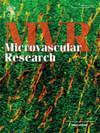Intermittent heat stress facilitates the autophagy and apoptosis of the vascular endothelium in spontaneously hypertensive rats via the AMPK/mTOR/ULK1 pathway
IF 2.7
4区 医学
Q2 PERIPHERAL VASCULAR DISEASE
引用次数: 0
Abstract
This study examined the autophagy and apoptosis of vascular endothelial cells in spontaneously hypertensive rats (SHRs) under intermittent heat stress and determined whether the AMP-activated protein kinase (AMPK)/mammalian target of rapamycin (mTOR)/Unc-51 like autophagy activating kinase (ULK1) pathway is involved in autophagy regulation. Wistar-Kyoto (WKY) rats were assigned to control (WKY-CN), intermittent heat stress (WKY-8), and continuous heat stress (WKY-24) groups. SHRs were also assigned to three groups: SHR-CN, SHR-8, and SHR-24. Western blotting assay, immunohistochemical assay, and immunofluorescence assay were performed for observing expression of proteins related to autophagy and apoptosis and the AMPK/mTOR/ULK1 pathway. Vascular endothelial cells underwent autophagy and apoptosis following heat stress, as revealed by high expression of autophagy- and apoptosis-related proteins. Heat stress elevated AMPK and ULK1 expression levels, whereas it decreased mTOR phosphorylation in SHR-8 and SHR-24 groups. Finally, the rats in SHR-8 group were administered an autophagy inducer (rapamycin, Rapa) and inhibitor (3-Methyladenine, 3-MA), respectively, for evaluating autophagy induction and inhibition. Following Rapa administration, LC3-II/LC3-I and Caspase-3 expression levels were elevated in the intermittent heat stress groups as compared to those in the control groups; in contrast, 3-MA attenuated cell death in the intermittent heat stress groups. Overall, this study demonstrated that intermittent heat stress elicits autophagy and apoptosis processes in vascular endothelial cells and that the AMPK/mTOR/ULK1 pathway participates in regulating autophagy and apoptosis.
间歇性热应激通过AMPK/mTOR/ULK1通路促进自发性高血压大鼠血管内皮的自噬和凋亡
本研究检测间歇性热应激下自发性高血压大鼠(SHRs)血管内皮细胞的自噬和凋亡情况,确定amp活化蛋白激酶(AMPK)/哺乳动物雷帕霉素靶蛋白(mTOR)/Unc-51样自噬激活激酶(ULK1)通路是否参与自噬调控。Wistar-Kyoto (WKY)大鼠分为对照组(WKY- cn)、间歇性热应激组(WKY-8)和持续性热应激组(WKY-24)。SHRs也被分为3组:shrr - cn、shrr -8和shrr -24。采用Western blot、免疫组化、免疫荧光法观察细胞自噬、凋亡相关蛋白及AMPK/mTOR/ULK1通路的表达情况。热应激后血管内皮细胞发生自噬和凋亡,自噬和凋亡相关蛋白高表达。热应激升高了SHR-8和SHR-24组AMPK和ULK1的表达水平,而降低了mTOR的磷酸化水平。最后,shr8组大鼠分别给予自噬诱导剂(雷帕霉素,Rapa)和抑制剂(3-甲基腺嘌呤,3-MA),评价自噬诱导和抑制作用。给药后,与对照组相比,间歇性热应激组LC3-II/LC3-I和Caspase-3表达水平升高;相反,3-MA可减轻间歇性热应激组的细胞死亡。综上所述,本研究表明间歇性热应激诱导血管内皮细胞自噬和凋亡过程,AMPK/mTOR/ULK1通路参与了自噬和凋亡的调控。
本文章由计算机程序翻译,如有差异,请以英文原文为准。
求助全文
约1分钟内获得全文
求助全文
来源期刊

Microvascular research
医学-外周血管病
CiteScore
6.00
自引率
3.20%
发文量
158
审稿时长
43 days
期刊介绍:
Microvascular Research is dedicated to the dissemination of fundamental information related to the microvascular field. Full-length articles presenting the results of original research and brief communications are featured.
Research Areas include:
• Angiogenesis
• Biochemistry
• Bioengineering
• Biomathematics
• Biophysics
• Cancer
• Circulatory homeostasis
• Comparative physiology
• Drug delivery
• Neuropharmacology
• Microvascular pathology
• Rheology
• Tissue Engineering.
 求助内容:
求助内容: 应助结果提醒方式:
应助结果提醒方式:


